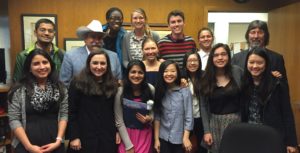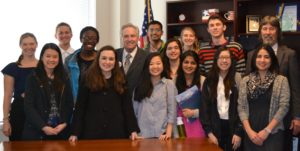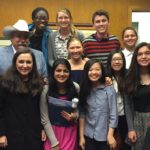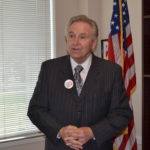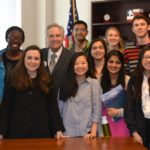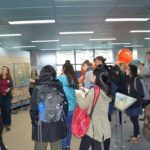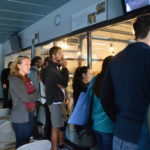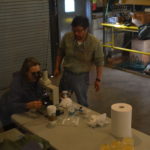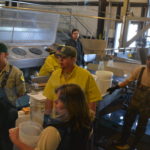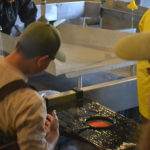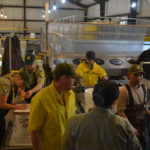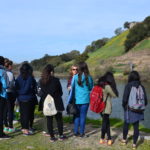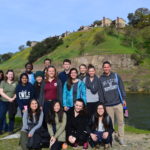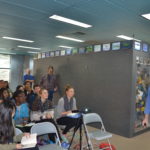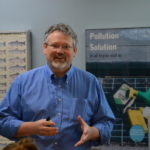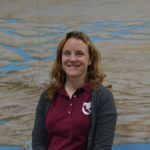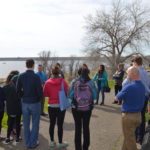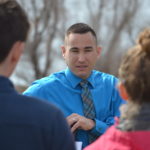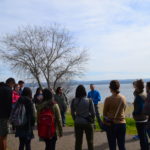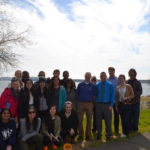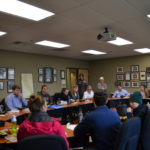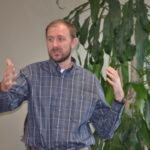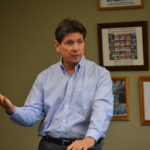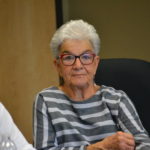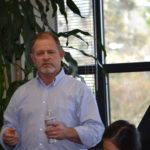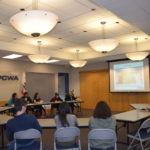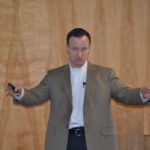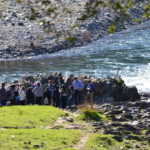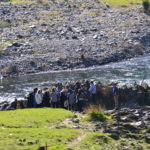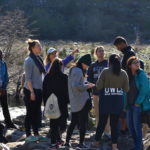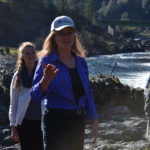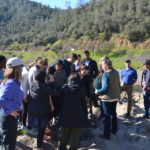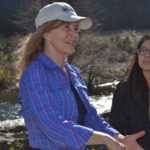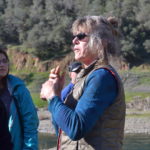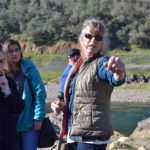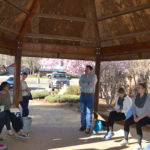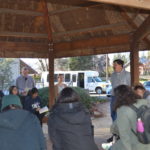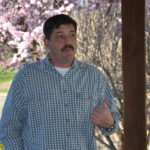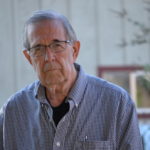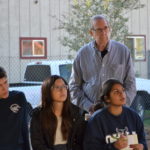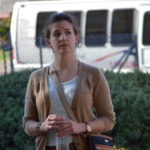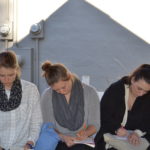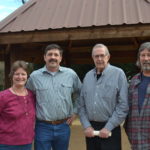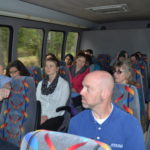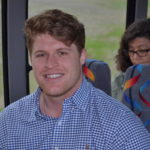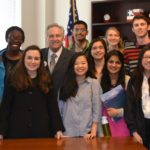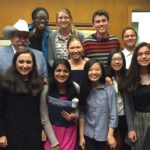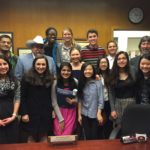Rice University – A Glass Half-Full: A Look into the Current Water Crisis in California and Strategies to Preserve our World’s Greatest Resource
Earlier this year, MCWRA had the unique opportunity to host 12 Rice University (Houston) students for a half day in Sacramento at the Capitol and a daylong tour of the American River Watershed. On the eight day Alternative Spring Break (ASB) trip, the students examined the impacts of the drought, visited local farms and communities most affected in the areas of San Francisco, Sacramento, and Fresno. The students also explored some of the causes and exacerbating factors of the drought, looking at the issue through the lens of climate change and policy. The students also looked at the issue of working with local water boards, conservancies, and supporting organizations that are raising awareness in the local communities in an effort to promote water conservation and sustainability.

Rice University Site Leaders Laura and Kate Nicholson
We (Kate & Laura) were inspired to start this ASB journey by our concern for what we had heard about the drought in California and what the trend could mean for all of our futures. The process of developing, planning and executing this trip was challenging, but well beyond worth it for us. We felt so lucky to have such passionate, engaged and intelligent participants on our trip, their thoughts and contibutions to discussions made the trip what it was. We are also so very thankful for all the people we met with throughout the trip. Everyone we spoke to had an amazing story to tell and something real to teach us. Countless people went far out of their way to help us and we could not have done it without them.
Througout the week, the students took copious notes on the presentations and discussions with and by the many different resource we met with. At the end of each day we then reflected as a group on the topics covered for that day and our reactions to them. In the end we formed a blog written in collaboration with the group.
On Day 3 of our eight day California trip, we moved on to the Capitol building, where, with the gracious help of Mr. John Kingsbury, MCWRA executive director, we met with State Senator Jim Nielsen, State Assemblymember Frank Bigelow, and Carolyn Angius from the Governor’s office, Through these discussions with policy makers, “we received a broadened perspective on agriculture and its relation to policy, as well as what policies were being put in place to help different communities, from urban to rural.”
Day 4: Tour of Nimbus Hatchery, Folsom Reservoir, Sierra Nevada Conservancy, Placer County, Foresthill

Kingsbury. Before departing, we met Debbie Davis Franco, a community affairs advisor and drought liaison from the Governor’s office, and Barbara Balen, a USDA Forest Service District Archaeologist who would both be accompanying us on our tour for the day. Our first stop was at the Nimbus Fish Hatchery, where we were given a fabulous tour of the facilities from Laura Drath, a public relations interpreter from the Fish & Wildlife service. Following this, Tom Gohring, the executive director of the Water Forum gave us a presentation about the Water Forum as a group and how they came about making important decisions that would impact huge numbers of people and their livelihoods. He specifically focused on the American River Water Stakeholder Agreement, which was a groundbreaking agreement made in 2000 between water purveyors to better understand the relative importance of all factors pulling at the water resources.
This then brought us to the Sierra Nevada Conservancy office, where we met with Bob Kingman, the assistant executive director of the conservancy, Josh Huntsinger, the Placer County Agricultural Commissioner, and the local foods advocate and author, Joanne Neft. Here we had a delicious, local lunch provided by Joanne and coordinated by Mr. Kingsbury. Joanne was even so kind to give each of the participants a copy of her cookbook! We learned much more about how the conservancy operates and the importance of forest management and the role water plays in the maintenance of the Sierra Nevada forests.
After lunch, we all made our way to the Placer County Water Agency where we spoke to Andy Fecko, the director of resource planning of the agency. He educated us about the challenges we face when addressing water in California.
After meeting with Mr. Fecko, our bus made a stop at the confluence of the middle and north fork of the american river. This was an amazing and beautiful area and a wonderful setting to learn about the management of watershed resources from Marie Davis, a registered professional geologist and consultant to the Placer County Water Agency.
Our final stop was at Foresthill, a small community north-east of Sacramento. There we learned more about the challenges more rural communities face in terms of water. For this, we spoke to Hank White, the general manager of the Foresthill Public Utility District. We learned much more about the difficulties of trying to manage a water resource, when monetary resources are low and the intricacies of water rights.
Reflection
Overall, I think I got more out of this day than any other particular day. I hadn’t really known what the particular role of fisheries were, and had no idea how they functioned, I found it particularly interesting how they would maintain the populations of the fish species via manual breeding. Additionally, learning about the other methods, such as fish ladders, and challenges associated with this field and the reasons for it coming into being were also very interesting.
Furthermore, the discussion about the stakeholder agreement further opened my eyes to the many different industries that are all sharing in this precious resource and how difficult finding co-equal goals, or goals that balance a reliable water supply with the protection of the lower american river. The discussion with Mr. Yasutake was also very interesting as we learned more about water reservoirs and Folsom reservoir in particular. Overall it very much seemed like the factors that made the biggest difference in how much water a particular interest group would be able to obtain depended mainly on how much power and money they had, not unlike many other aspects of our society.
Lunchtime was a surprisingly educational moment for me. Hearing Joanne’s enthusiasm and passion for the importance of having local food was very inspiring and her concerns for imported food and the impact of antibiotics in meat products are very real. I also very much agree with her concerns for the growing areas called “food deserts” where people do not have access to local, healthy foods. While theoretically you could eat food only from Placer county all year long, coming from Minnesota, I wonder what kinds of solutions are possible for areas that have a much shorter growing seasons…? Additionally, I hope there are future progress in terms of the prices of organic and local foods as in almost all cases, the conventional foods are much cheaper. Additionally, it was very interesting learning more about the forest outside our windows, especially about its role in water absorption, the changing melting patterns of the snopak and the connection between forest mismanagement and the over-absorption of critical snopak water.
Following the California trip, the students created a website portal of the trip: http://lptn14.wix.com/riceuglasshalffull
RICE UNIVERSITY STUDENTS to return to the Mountain Counties in 2017: My name is Cindy Nguyen, and I am an undergraduate from Rice University in Houston, TX. I will be leading an Alternative Spring Break (ASB) Trip that will be focusing on water quality issues and water justice. You might remember me and my co-leader Nimi Oyelele, because we were on the ASB trip led by Kate and Laura Nicholson this past spring break! We can’t thank you enough for the workshops you organized for us, and because we were so inspired and motivated to learn more, we’ve signed up to make this trip happen again for spring break of 2017, except we will be leading a new group of students and introduce them to the wonderful organizations that we spoke with before.
